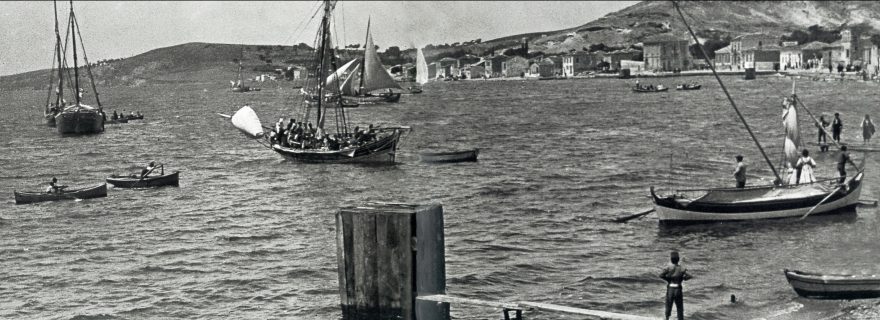On the centenary of forced migration in Western Anatolia
This spring marks the centenary of forced migration in Western Anatolia. The consequences of this displacement policy are still tangible; many contemporary problems such as under-development and political instability are related to it.
Cover photo: the town of Eski Foça during the flight of the local Greeks from the county on 13 June 1914. Source: Haris Yiakoumis et al., Phocée 1913-1920. Le Témoignage de Félix Sartiaux (Paris, 2008), 214-215.
Transformations of imperial empires into nation-states have been troublesome and violent. The collapse of the Ottoman Empire and the creation of numerous nation-states between the late eighteenth century and early twentieth century led to the displacement of some six million people and the death of thousands. The most violent chapter of this period of peoples’ displacement, and the massacre of – at times wholesale communities of – Christians, Muslims or Jews, took place roughly within the last fifty years of the Ottoman Empire.
For the Middle East, the years between 1912 and 1923 were particularly dramatic. This period was marked by a change of the demographic make-up of the Middle East and brought the de-Islamization of the Balkans and the de-Christianization of Anatolia. Still today we witness problems caused by the process of the emergence of nation-states in the Middle East and the Balkans. Westphalian ideas of nationhood, referring to the concept of sovereignty of nation-states, still cause problems of political and economical legitimization in the complex and diverse post-imperial societies.
Almost a hundred years ago, during the spring of 1914 and right before the outset of the Great War, the sizeable Greek Orthodox community of the Ottoman Empire in Western Anatolia was subjected to economic boycotts and deportations. The result was a mass exodus of Ottoman Greeks. Their forced migration was legitimized by a nationalist and security rationale.
Nationalism had been part of Ottoman politics since the beginning of the nineteenth century. However, it was only after the traumatic losses of the Balkan Wars (1912-1913) that nationalism became predominant among the Muslim rulers of the Ottoman Empire. The members and supporters of the Committee of Union and Progress (CUP), who ruled the Ottoman Empire after a coup in 1913, started to label the Orthodox Christians of the Ottoman Empire as a “fifth column” within Ottoman society.
To a large extent this was due to the successful annexation of Ottoman territories by the Kingdom of Greece at that time, which had been expanding its territories ever since its establishment as an independent sovereign kingdom in 1830. Muslims in those territories were mistreated or forced to migrate. Because Greece was among the victors of the Balkan Wars it was able to bring important parts of the Ottoman Balkans and Aegean islands under its control. The CUP feared the expansion of Greece into Anatolia and used this fear to strengthen its Muslim nationalist policies.
Approximately 160.000 Ottoman Greeks were ousted or fled their homelands in the course of the spring of 1914. Almost the entire Western Anatolian coastline was “cleansed” of its Christian Orthodox population, with the exception of Izmir (Smyrna), the internationally renown port-city of the eastern Mediterranean, and some prominent towns like Ayvalık. Many other towns, such as Foçateyn, Çeşme and Edremit, as well as towns and villages on or near the Kasaba-Aydın railway and around Bursa were subjected to the violence of Muslim bandits (chettes) who drove the native Christian populations out of these places.
Most Ottoman Greeks left their houses and property in such a rush as a result of which many of their belongings and valuables were left behind. Those who resisted or were too old to leave were subjected to violence by the bandits. Muslim refugees originating from the lost Ottoman territories in the Balkans (muhacirs) were settled in the houses of Ottoman Greeks. This was a conscious policy of the Muslim nationalist CUP of the time. From their nationalist point of view Western Anatolia, now with a Muslim majority, was “safe” from the dangers of Greek irredentism.
The CUP legitimized its demographic policy directed against the Ottoman Christians with reference to the injustice of the forced migration of Muslims by nationalists on the Balkans. In this way, the victims of one nationalism were used to create victims of another one. This “blame game” is still reminiscent among nationalist circles in both countries and has until recently been a very dominant perception in diplomacy. The victims of these nationalist policies were the peoples of the places that were drastically affected by this process of what has been labeled “demographic engineering” and the subsequent wars and destruction in both Greece and Turkey.
Many contemporary problems of political instability, under-development and violence in the region are related to the ways in which the transition from empire to various nation-states took place. Today the sour memories of forced migration and years of war still haunt the relationship between the Muslim and non-Muslim communities of the Balkans, Anatolia, and the Middle East.
Yet the re-expansion of global capitalism blurs the boundaries of nation-states and challenges the ideal of culturally homogenous societies. Under the new economic order coexistence, cosmopolitanism and pluralism are becoming strong alternatives to the nation-state paradigm. Peoples who were part of the old Ottoman Empire – Arabs, Armenians, Greeks, Turks, Kurds and many others – are faced with a dilemma: will they refashion coexistence, for which they paid a huge price to avoid, or will they hinge upon the illusions of cultural narcissism and a homogenous nation-state?
For a more detailed reading on forced migration in Western Anatolia, see
Emre Erol, “Organized chaos as diplomatic ruse and demographic weapon: The expulsion of the Ottoman Greeks (Rum) from Foça, 1914,” Tijdschrift voor Sociaal-Economische Geschiedenis, 4 (2013): 66-96.



1 Comment
Prima! Een informatief en helder stuk.